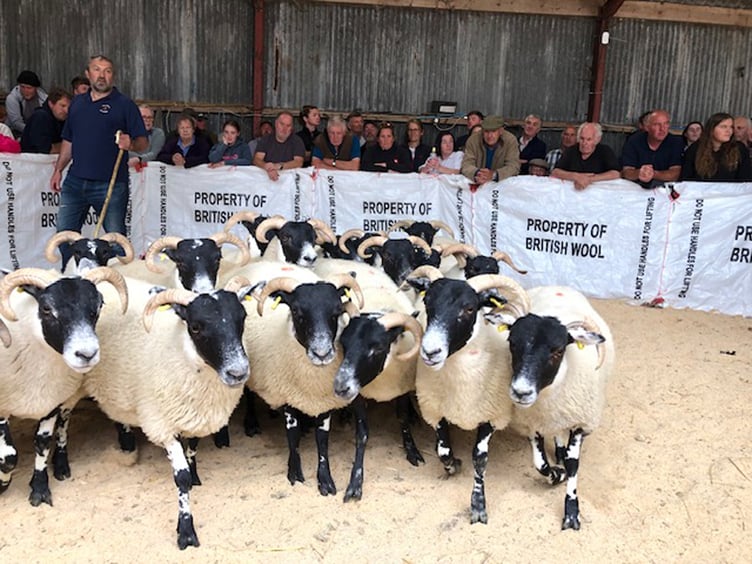Last week, after the excitement of the agricultural shows, the sheep sales began.
Auctioneer Peter Quayle, from Central Marts, said that they have gone well.
Anna and Keith Kerruish’s Sale at Ballafayle, Maughold, saw Mule shearling ewes selling from £150 to £158 and Texel X and Cheviot X at £145
The Creer family’s Ballaglonney Sale is a highlight for the Mart, with many breeds of sheep and a great variety of rams on offer.
Prices were better than expected and everything sold.
Peter said: ‘Ballaglonney stock has a good reputation and has been successfully shown and won many prizes in the UK.
‘There was live streaming for off island buyers, but nearly all stock was bought locally.
‘Well done to all Mart staff, Ballaglonney staff and all other helpers, and the caterers.’
Paula Creer said: ‘In what is probably a Manx record price for a ewe, a pedigree Dutch Spotted ewe sold at £900.00.
‘The top price for shearling ewes was £210 for New Zealand Suffolk crosses and the top priced ram was a Texel at £1800.’
But the overall picture going forward is not quite as rosy as these sales suggest.
Peter Quayle and his team run regular stock sales at Central Marts, Knockaloe, and so he has a fair grasp on how the market is going.
He told us that the biggest ongoing worry is the meat plant.
He said: ‘It’s a major drawback on farmers’ confidence, with cancellations and staggered intake. For farmers to have confidence to buy sheep now, they need to know that when their lambs are ready next year, there will be a market for them.
‘There are massive problems at the plant which may take a magician to sort out!’
He continued: ‘There have been several reports and surveys, but not many changes and the situation is worse than ever with staffing levels and staff morale.
‘It’s a crazy situation when a lot of our Manx meat is exported, and meat from all over the world is imported.
‘Some of the imported meat has been produced with the use of growth hormones – products which have been banned on the island for over 40 years.
‘Isle of Man Stock is produced on a much smaller scale and in many cases to a higher standard.
‘The products from the meat plant are very good. It’s a shame that more Manx meat is not readily available in many Manx butchers and Supermarkets.
‘Friends, customers, always ask: “Is it really Manx?”’
Peter’s views on the market were reflected in the results of a survey carried out recently by the Fatstock Marketing Association.
Its findings were communicated to producers by the FMA in a message which read: ‘We thank all those producers who took the time to engage in our producer survey.
‘We had a good number of responses with a lot of constructive comments for each of the questions,’ he said.
‘In short, the main points made were: shortcomings in communications with producers, poor throughput causing unacceptable pressures on farmers’ cashflow and profitability, and questions surrounding the marketing levy and distribution charge. The FMA was also criticised for a lack of communications with the industry – and rightly so.
‘We have been continually pushing for information from them to be able to pass on to you but we have now been assured that this will happen on a regular basis.
‘We presented a summary of the survey results to the MCL board on Monday afternoon.
‘We were informed at the meeting that these came as no surprise to them – but at least they can now look at a true picture of your concerns and act on them accordingly.
‘They have stated that they will be able to come back to us with their responses in the next two weeks.
‘Once we receive these, we will circulate them to all producers and would welcome any comments and questions you may have arising from these, for us to take forward further.’





Comments
This article has no comments yet. Be the first to leave a comment.